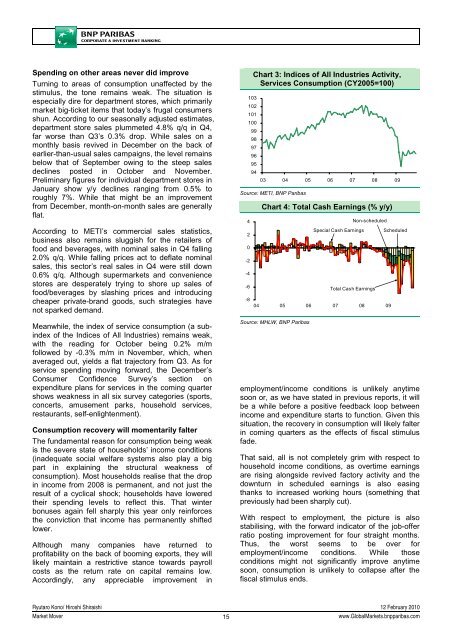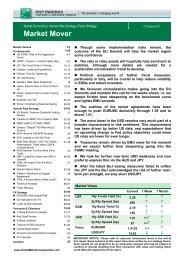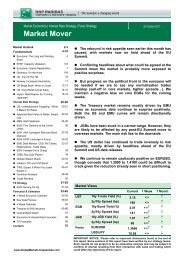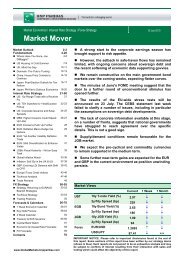Market Mover - BNP PARIBAS - Investment Services India
Market Mover - BNP PARIBAS - Investment Services India
Market Mover - BNP PARIBAS - Investment Services India
You also want an ePaper? Increase the reach of your titles
YUMPU automatically turns print PDFs into web optimized ePapers that Google loves.
Spending on other areas never did improve<br />
Turning to areas of consumption unaffected by the<br />
stimulus, the tone remains weak. The situation is<br />
especially dire for department stores, which primarily<br />
market big-ticket items that today’s frugal consumers<br />
shun. According to our seasonally adjusted estimates,<br />
department store sales plummeted 4.8% q/q in Q4,<br />
far worse than Q3’s 0.3% drop. While sales on a<br />
monthly basis revived in December on the back of<br />
earlier-than-usual sales campaigns, the level remains<br />
below that of September owing to the steep sales<br />
declines posted in October and November.<br />
Preliminary figures for individual department stores in<br />
January show y/y declines ranging from 0.5% to<br />
roughly 7%. While that might be an improvement<br />
from December, month-on-month sales are generally<br />
flat.<br />
According to METI’s commercial sales statistics,<br />
business also remains sluggish for the retailers of<br />
food and beverages, with nominal sales in Q4 falling<br />
2.0% q/q. While falling prices act to deflate nominal<br />
sales, this sector’s real sales in Q4 were still down<br />
0.6% q/q. Although supermarkets and convenience<br />
stores are desperately trying to shore up sales of<br />
food/beverages by slashing prices and introducing<br />
cheaper private-brand goods, such strategies have<br />
not sparked demand.<br />
Meanwhile, the index of service consumption (a subindex<br />
of the Indices of All Industries) remains weak,<br />
with the reading for October being 0.2% m/m<br />
followed by -0.3% m/m in November, which, when<br />
averaged out, yields a flat trajectory from Q3. As for<br />
service spending moving forward, the December’s<br />
Consumer Confidence Survey’s section on<br />
expenditure plans for services in the coming quarter<br />
shows weakness in all six survey categories (sports,<br />
concerts, amusement parks, household services,<br />
restaurants, self-enlightenment).<br />
Consumption recovery will momentarily falter<br />
The fundamental reason for consumption being weak<br />
is the severe state of households’ income conditions<br />
(inadequate social welfare systems also play a big<br />
part in explaining the structural weakness of<br />
consumption). Most households realise that the drop<br />
in income from 2008 is permanent, and not just the<br />
result of a cyclical shock; households have lowered<br />
their spending levels to reflect this. That winter<br />
bonuses again fell sharply this year only reinforces<br />
the conviction that income has permanently shifted<br />
lower.<br />
Although many companies have returned to<br />
profitability on the back of booming exports, they will<br />
likely maintain a restrictive stance towards payroll<br />
costs as the return rate on capital remains low.<br />
Accordingly, any appreciable improvement in<br />
103<br />
102<br />
101<br />
100<br />
99<br />
98<br />
97<br />
96<br />
95<br />
94<br />
Chart 3: Indices of All Industries Activity,<br />
<strong>Services</strong> Consumption (CY2005=100)<br />
03 04 05 06 07 08 09<br />
Source: METI, <strong>BNP</strong> Paribas<br />
4<br />
2<br />
0<br />
-2<br />
-4<br />
-6<br />
-8<br />
Chart 4: Total Cash Earnings (% y/y)<br />
04 05 06 07 08 09<br />
Source: MHLW, <strong>BNP</strong> Paribas<br />
Special Cash Earnings<br />
Non-scheduled<br />
Total Cash Earnings<br />
Scheduled<br />
employment/income conditions is unlikely anytime<br />
soon or, as we have stated in previous reports, it will<br />
be a while before a positive feedback loop between<br />
income and expenditure starts to function. Given this<br />
situation, the recovery in consumption will likely falter<br />
in coming quarters as the effects of fiscal stimulus<br />
fade.<br />
That said, all is not completely grim with respect to<br />
household income conditions, as overtime earnings<br />
are rising alongside revived factory activity and the<br />
downturn in scheduled earnings is also easing<br />
thanks to increased working hours (something that<br />
previously had been sharply cut).<br />
With respect to employment, the picture is also<br />
stabilising, with the forward indicator of the job-offer<br />
ratio posting improvement for four straight months.<br />
Thus, the worst seems to be over for<br />
employment/income conditions. While those<br />
conditions might not significantly improve anytime<br />
soon, consumption is unlikely to collapse after the<br />
fiscal stimulus ends.<br />
Ryutaro Kono/ Hiroshi Shiraishi 12 February 2010<br />
<strong>Market</strong> <strong>Mover</strong><br />
15<br />
www.Global<strong>Market</strong>s.bnpparibas.com
















